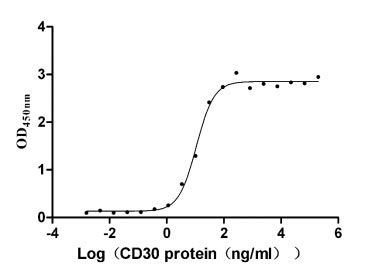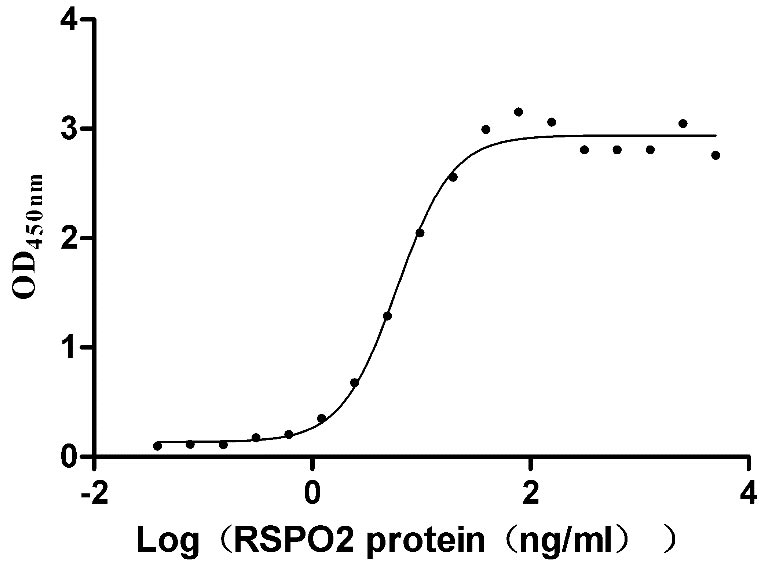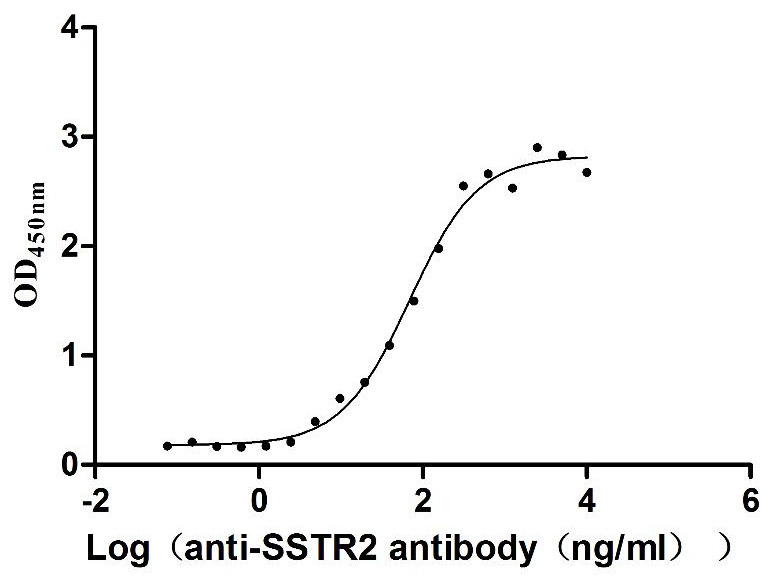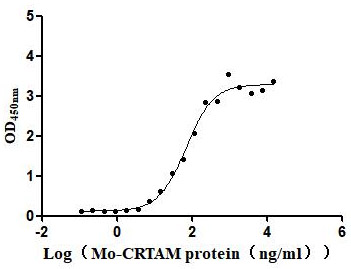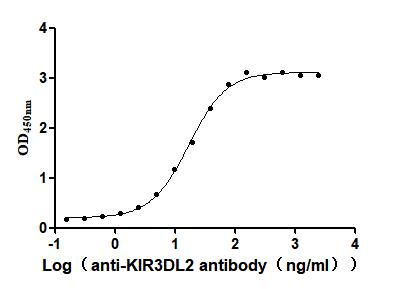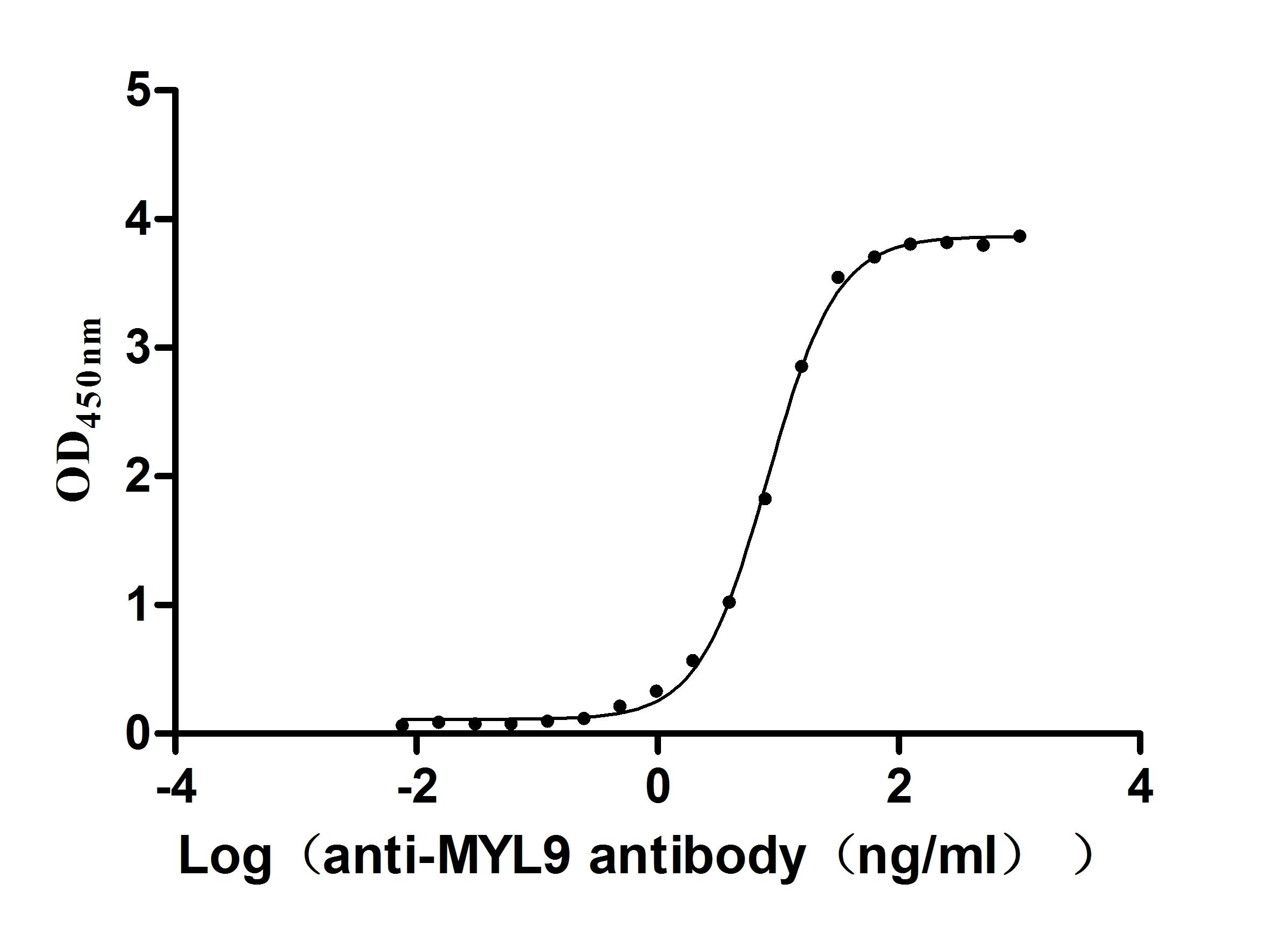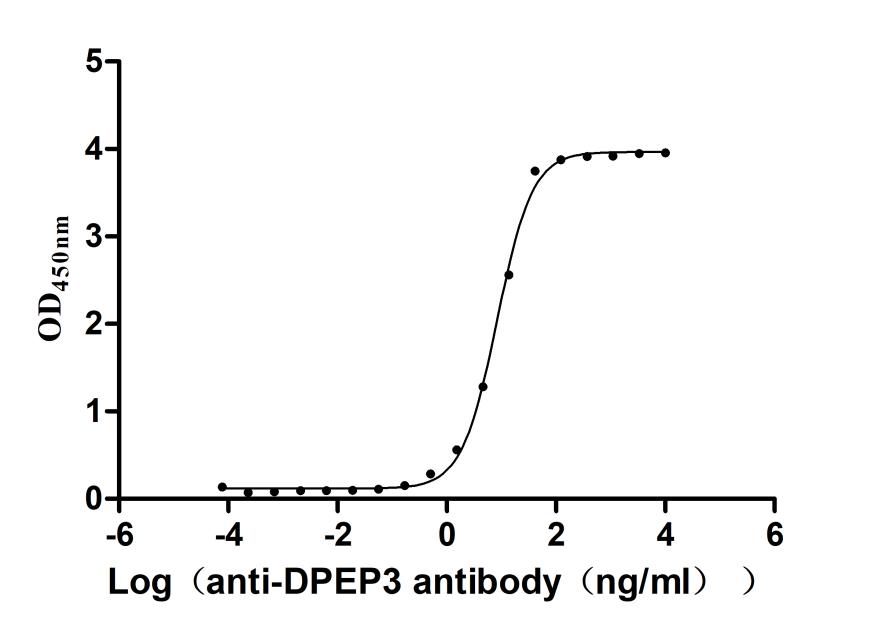Recombinant Mouse Histone-lysine N-methyltransferase EZH2 (Ezh2)
-
货号:CSB-YP723402MO
-
规格:
-
来源:Yeast
-
其他:
-
货号:CSB-EP723402MO
-
规格:
-
来源:E.coli
-
其他:
-
货号:CSB-EP723402MO-B
-
规格:
-
来源:E.coli
-
共轭:Avi-tag Biotinylated
E. coli biotin ligase (BirA) is highly specific in covalently attaching biotin to the 15 amino acid AviTag peptide. This recombinant protein was biotinylated in vivo by AviTag-BirA technology, which method is BriA catalyzes amide linkage between the biotin and the specific lysine of the AviTag.
-
其他:
-
货号:CSB-BP723402MO
-
规格:
-
来源:Baculovirus
-
其他:
-
货号:CSB-MP723402MO
-
规格:
-
来源:Mammalian cell
-
其他:
产品详情
-
纯度:>85% (SDS-PAGE)
-
基因名:
-
Uniprot No.:
-
别名:Ezh2; Enx1hHistone-lysine N-methyltransferase EZH2; EC 2.1.1.356; ENX-1; Enhancer of zeste homolog 2
-
种属:Mus musculus (Mouse)
-
蛋白长度:full length protein
-
表达区域:1-746
-
氨基酸序列MGQTGKKSEK GPVCWRKRVK SEYMRLRQLK RFRRADEVKT MFSSNRQKIL ERTETLNQEW KQRRIQPVHI MTSVSSLRGT RECSVTSDLD FPAQVIPLKT LNAVASVPIM YSWSPLQQNF MVEDETVLHN IPYMGDEVLD QDGTFIEELI KNYDGKVHGD RECGFINDEI FVELVNALGQ YNDDDDDDDG DDPDEREEKQ KDLEDNRDDK ETCPPRKFPA DKIFEAISSM FPDKGTAEEL KEKYKELTEQ QLPGALPPEC TPNIDGPNAK SVQREQSLHS FHTLFCRRCF KYDCFLHPFH ATPNTYKRKN TETALDNKPC GPQCYQHLEG AKEFAAALTA ERIKTPPKRP GGRRRGRLPN NSSRPSTPTI SVLESKDTDS DREAGTETGG ENNDKEEEEK KDETSSSSEA NSRCQTPIKM KPNIEPPENV EWSGAEASMF RVLIGTYYDN FCAIARLIGT KTCRQVYEFR VKESSIIAPV PTEDVDTPPR KKKRKHRLWA AHCRKIQLKK DGSSNHVYNY QPCDHPRQPC DSSCPCVIAQ NFCEKFCQCS SECQNRFPGC RCKAQCNTKQ CPCYLAVREC DPDLCLTCGA ADHWDSKNVS CKNCSIQRGS KKHLLLAPSD VAGWGIFIKD PVQKNEFISE YCGEIISQDE ADRRGKVYDK YMCSFLFNLN NDFVVDATRK GNKIRFANHS VNPNCYAKVM MVNGDHRIGI FAKRAIQTGE ELFFDYRYSQ ADALKYVGIE REMEIP
-
蛋白标签:Tag type will be determined during the manufacturing process.
The tag type will be determined during production process. If you have specified tag type, please tell us and we will develop the specified tag preferentially. -
产品提供形式:Lyophilized powder
Note: We will preferentially ship the format that we have in stock, however, if you have any special requirement for the format, please remark your requirement when placing the order, we will prepare according to your demand. -
复溶:We recommend that this vial be briefly centrifuged prior to opening to bring the contents to the bottom. Please reconstitute protein in deionized sterile water to a concentration of 0.1-1.0 mg/mL.We recommend to add 5-50% of glycerol (final concentration) and aliquot for long-term storage at -20℃/-80℃. Our default final concentration of glycerol is 50%. Customers could use it as reference.
-
储存条件:Store at -20°C/-80°C upon receipt, aliquoting is necessary for mutiple use. Avoid repeated freeze-thaw cycles.
-
保质期:The shelf life is related to many factors, storage state, buffer ingredients, storage temperature and the stability of the protein itself.
Generally, the shelf life of liquid form is 6 months at -20°C/-80°C. The shelf life of lyophilized form is 12 months at -20°C/-80°C. -
货期:Delivery time may differ from different purchasing way or location, please kindly consult your local distributors for specific delivery time.Note: All of our proteins are default shipped with normal blue ice packs, if you request to ship with dry ice, please communicate with us in advance and extra fees will be charged.
-
注意事项:Repeated freezing and thawing is not recommended. Store working aliquots at 4°C for up to one week.
-
Datasheet :Please contact us to get it.
靶点详情
-
功能:Polycomb group (PcG) protein. Catalytic subunit of the PRC2/EED-EZH2 complex, which methylates (H3K9me) and 'Lys-27' (H3K27me) of histone H3, leading to transcriptional repression of the affected target gene. Able to mono-, di- and trimethylate 'Lys-27' of histone H3 to form H3K27me1, H3K27me2 and H3K27me3, respectively. Displays a preference for substrates with less methylation, loses activity when progressively more methyl groups are incorporated into H3K27, H3K27me0 > H3K27me1 > H3K27me2. Compared to EZH1-containing complexes, it is more abundant in embryonic stem cells and plays a major role in forming H3K27me3, which is required for embryonic stem cell identity and proper differentiation. The PRC2/EED-EZH2 complex may also serve as a recruiting platform for DNA methyltransferases, thereby linking two epigenetic repression systems. Genes repressed by the PRC2/EED-EZH2 complex include HOXA7, HOXB6 and HOXC8. EZH2 can also methylate non-histone proteins such as the transcription factor GATA4 and the nuclear receptor RORA. Regulates the circadian clock via histone methylation at the promoter of the circadian genes. Essential for the CRY1/2-mediated repression of the transcriptional activation of PER1/2 by the CLOCK-ARNTL/BMAL1 heterodimer; involved in the di and trimethylation of 'Lys-27' of histone H3 on PER1/2 promoters which is necessary for the CRY1/2 proteins to inhibit transcription.
-
基因功能参考文献:
- Exogenous RA signaling activation in the Ezh2 mutants leads to synergistic activation of the anti-osteogenic factors in the cranial mesenchyme in vivo. Thus, RA signaling and EZH2 can function in parallel to guide calvarial bone progenitor commitment by balancing the suppression of anti-osteogenic factors. PMID: 30222957
- p38-mediated phosphorylation at threonine 367 induces EZH2 cytoplasmic localization to promote breast cancer metastasis. PMID: 30022044
- Targeting EZH2 reactivates a breast cancer subtype-specific anti-metastatic transcriptional program driven by FOXC1. PMID: 29959321
- Praja1 promotes skeletal myogenesis through degradation of EZH2 upon p38alpha activation. PMID: 28067271
- the data demonstrate that EZH2 is essential in facilitating epigenetic changes that regulate antibody-secreting cell fate, function, and metabolism. PMID: 29288200
- Data show that the histone methyltransferase Ezh2 controls CD8(+) T memory precursor formation and antitumor activity. PMID: 29242551
- Ezh2 maintains the repression of key cell senescence inducer genes through H3K27me3, and deletion of Ezh2 in early pubertal mice results in premature cellular senescence, depleted MSPCs pool, and impaired osteogenesis as well as osteoporosis in later life. PMID: 29101351
- Our data demonstrates that EZH2 participates in Glioblastoma multiforme-induced immune deficient and EZH2 suppression in Glioblastoma multiforme can remodel microglia immune functions PMID: 29132376
- the induction of EZH2 led to beta-catenin signaling activation by increasing H3K27me3 on the promoter of SFRP1, while the inhibition of EZH2 silenced beta-catenin signaling. Finally, intraarticular injection of EPZ005687 delayed OA development in mice. These results implicated EZH2 activity in OA development. Pharmacological inhibition of EZH2 may be an effective therapeutic approach for osteoarthritis. PMID: 27539752
- PRC2-mediated repression of SMARCA2 predicts EZH2 inhibitor activity in SWI/SNF mutant tumors. PMID: 29087303
- EZH2 plays a nonclassical role in the regulation of spermatogonial differentiation and apoptosis in murine spermatogenesis. PMID: 28982932
- macroH2A1.1 (mH2A1.1), a variant of histone H2A, was upregulated during adipocyte differentiation in 3T3-L1 cells and in the white adipose tissue of obese mice. mH2A1.1 regulated Wnt/beta-catenin signaling pathway by cooperating with EZH2, a histone H3K27 methyltransferase, thus led to accumulation of H3K27me2 and H3K27me3 on the promoters of Wnt genes. PMID: 28992292
- findings highlight an epigenetic mechanism by which EZH2 integrates the multifaceted effects of TNFalpha signaling to promote the inflammatory response and apoptosis in colitis. PMID: 28439030
- cardiomyocyte-specific loss of Ezh2 did not affect fibrotic scar size after MI or apical resection at P7, suggesting that it does not extend the regenerative time window. Our results demonstrate that Ezh2 is not required for innate neonatal cardiac regeneration PMID: 29466371
- results, together with our previous report, support a cell lineage-specific mechanism of Ezh2-mediated gene repression, especially those critically involved in cellular function and homeostasis PMID: 29408885
- CARM1 promotes EZH2-mediated silencing of EZH2/BAF155 target tumor suppressor genes by methylating BAF155. PMID: 29434212
- EZH2 mediates germinal centre (GC) formation through epigenetic silencing of CDKN1A and release of cell cycle checkpoints. PMID: 29026085
- It has been demonstrated that FAK depletion reduces hepatocellular carcinoma cell growth by affecting cancer-promoting genes including the pro-oncogene EZH2. PMID: 28338656
- decline in HDAC9c expression over time was accompanied by increased EZH2 expression. PMID: 27250566
- Long non-coding RNA LOC554202 may play an important role in the progression of chordoma by the direct upregulation of EZH2 and indirect promotion of RNF144B via miR-31 PMID: 28963737
- Gfi1 disruption antagonized the tumor-promoting effects of Ezh2 loss; conversely, Gfi1 overexpression collaborated with Myc to bypass effects of Trp53 inactivation in driving medulloblastoma progression in primary cerebellar neuronal progenitors. PMID: 28329683
- EZH2-deficient hESCs can initiate differentiation toward developmental lineages; however, they cannot fully differentiate into mature specialized tissues. Thus, EZH2 is required for stable ESC self-renewal, regulation of transcriptional programs, and for late-stage differentiation in this model of early human development. PMID: 27926872
- we found that the miRNA biogenesis enzyme DICER was required for the binding of the PRC2 core components EZH2 and SUZ12, and for the presence of the PRC2-mediated histone modification H3K27me3 at many bivalent genes PMID: 27150236
- High EZH2 expression is associated with Neuroblastoma. PMID: 28807939
- Biochemical as well as functional experiments revealed that Spt6 could compete for binding of the PRC2 methyltransferase Ezh2 to Suz12 and reduce PRC2 chromatin engagement. PMID: 29033324
- These findings indicate that Ezh2 targets are the major targets of the epigenetic switch in MDS with Ezh2 insufficiency. PMID: 27694924
- Insight regarding how androgen-induced extranuclear kinase signaling and intranuclear transcription through Ezh2 modifications may influence the expression pattern of genes, ultimately affecting various downstream physiological processes. PMID: 28666321
- results uncover a crucial role for EZH2 in adaptive lymphocytes to control the developmental timing of effectors of the pre-Ag receptor checkpoints PMID: 28490575
- These findings identify the Ezh2-Hsp90 interaction as a previously unrecognized mechanism essential for T-cell responses and an effective target for controlling graft-versus-host disease. PMID: 28246193
- Eed and Ezh2 have distinct roles in urothelial differentiation PMID: 28049658
- Findings uncover an Ezh2-dependent mechanism to restrict the smooth muscle gene expression program in the developing mesothelium and allow appropriate cell fate decisions to occur in this multipotent mesoderm lineage. PMID: 27578795
- This study identified Ezh2 as enriched in melanoma cancer stem cells (MCS cells) and showed that Ezh2 knockdown or treatment with small molecule Ezh2 inhibitors reduces MCS cell spheroid formation, survival, invasion and migration. PMID: 26693692
- Ezh2-/- deletion resulted in skeletal deformities, increased osteoclastogenic potential and upregulation of Rankl and M-csf expression by mesenchymal stem cells. PMID: 27934660
- These findings indicate Ezh2/PRC2 plays crucial roles in regulating neurogenesis from both cerebellar germinal zones. PMID: 27068104
- our results revealed a novel mechanism in which EZH2 stability is regulated by SKP2 through the TRAF6-mediated and K63-linked ubiquitination, which contributes to elevated levels of H3K27me3 during prostate tumorigenesis and CRPC growth. PMID: 27869166
- N-Myc Induces an EZH2-Mediated Transcriptional Program Driving Neuroendocrine Prostate Cancer and redirects EZH2 activity and sensitizes cells to EZH2 inhibitors. PMID: 27728805
- we propose that through its control of PLZF concentration, Ezh2 maintains NKT cell numbers at appropriate levels and facilitates immune homeostasis. We believe that our study establishes a paradigm for alternative roles of Ezh2 and non-histone methylation in the regulation of cell fate determination. PMID: 28223321
- Residual PRC2 activity, via EZH2 binding to mutant H3K27M histones, is required for the proliferation of H3K27M-expressing diffuse intrinsic pontine gliomas. PMID: 28263309
- EZH2 is part of the protein machinery that shapes the aging epigenome. PMID: 28249716
- S6K1 phosphorylation of H2B mediates EZH2 trimethylation of H3 early in adipogenesis, contributing to the promotion of obesity. PMID: 27151441
- results suggest that loss of Ezh2 cooperates with Jak2V617F in the development of myelofibrosis in Jak2V617F PMID: 27081096
- JAK2-V617F-expressing mice treated with an Ezh2 inhibitor showed higher platelet counts than vehicle controls. Our data support the proposed tumor suppressor function of EZH2 PMID: 27401344
- an EZH2 insufficiency not only cooperated with active JAK2 to induce MF, but also conferred an oncogenic addiction to the H3K27ac modification in primary myelofibrosis -initiating cells that was capable of being restored by bromodomain inhibition. PMID: 27401345
- The findings obtained from apoE-/- mice provide epigenetic insights into how EZH2 increases the risk of atherosclerotic heart disease. One of the pathways by which EZH2 leads to lipid accumulation and foam cell formation is via epigenetic downregulation of ABCA1 expression. PMID: 27295295
- Our data uncover a dual role of PRC2 in intestinal homeostasis highlighting the importance of this repressive layer in controlling cell plasticity and lineage choices in adult tissues PMID: 27585866
- The levels of EZH2 and H3K27me3 were increased in the aorta of ApoE-/- mice fed a high-methionine diet for 16 weeks, whereas miR-92a expression was decreased. PMID: 27936205
- the functional association between EZH2 expression and silencing of key tumor suppressor loci , was investigated. PMID: 27419533
- Menin binds on the promoter of Inhbb gene where it favours the recruitment of Ezh2 via an indirect mechanism involving Akt-phosphorylation. PMID: 28215965
- these results suggest that the inflammatory milieu found in Crohn's disease could lead to or result from deregulation of FOXP3/EZH2-enforced T cell gene networks contributing to the underlying intestinal inflammation. PMID: 27909059
- Data show that enhancer of zeste 2 polycomb repressive complex 2 subunit (EZH2-containing PRC2) is required for differentiation of terminal effector CD8+ T cells. PMID: 28410989
显示更多
收起更多
-
亚细胞定位:Nucleus. Chromosome.
-
蛋白家族:Class V-like SAM-binding methyltransferase superfamily, Histone-lysine methyltransferase family, EZ subfamily
-
组织特异性:Present in actively dividing cells. Widely expressed in early embryos. In later embryogenesis, expression restricted to central and peripheral nervous system, liver and thymus. In adult, highest expression in spleen, testis and placenta. Lower levels in i
-
数据库链接:
KEGG: mmu:14056
STRING: 10090.ENSMUSP00000080419
UniGene: Mm.246688
Most popular with customers
-
Recombinant Human Tumor necrosis factor ligand superfamily member 8 (TNFSF8), partial (Active)
Express system: Mammalian cell
Species: Homo sapiens (Human)
-
Recombinant Human E3 ubiquitin-protein ligase ZNRF3 (ZNRF3), partial (Active)
Express system: Mammalian cell
Species: Homo sapiens (Human)
-
Recombinant Human Somatostatin receptor type 2 (SSTR2)-VLPs (Active)
Express system: Mammalian cell
Species: Homo sapiens (Human)
-
Recombinant Mouse Cell adhesion molecule 1 (Cadm1), partial (Active)
Express system: Mammalian cell
Species: Mus musculus (Mouse)
-
Recombinant Human Killer cell immunoglobulin-like receptor 3DL2 (KIR3DL2), partial (Active)
Express system: Mammalian cell
Species: Homo sapiens (Human)
-
Recombinant Human Myosin regulatory light chain 12B(MYL12B) (Active)
Express system: E.coli
Species: Homo sapiens (Human)
-
Recombinant Human Dipeptidase 3(DPEP3), partial (Active)
Express system: Mammalian cell
Species: Homo sapiens (Human)
-
Recombinant Macaca fascicularis Dipeptidase 3(DPEP3) (Active)
Express system: Mammalian cell
Species: Macaca fascicularis (Crab-eating macaque) (Cynomolgus monkey)


